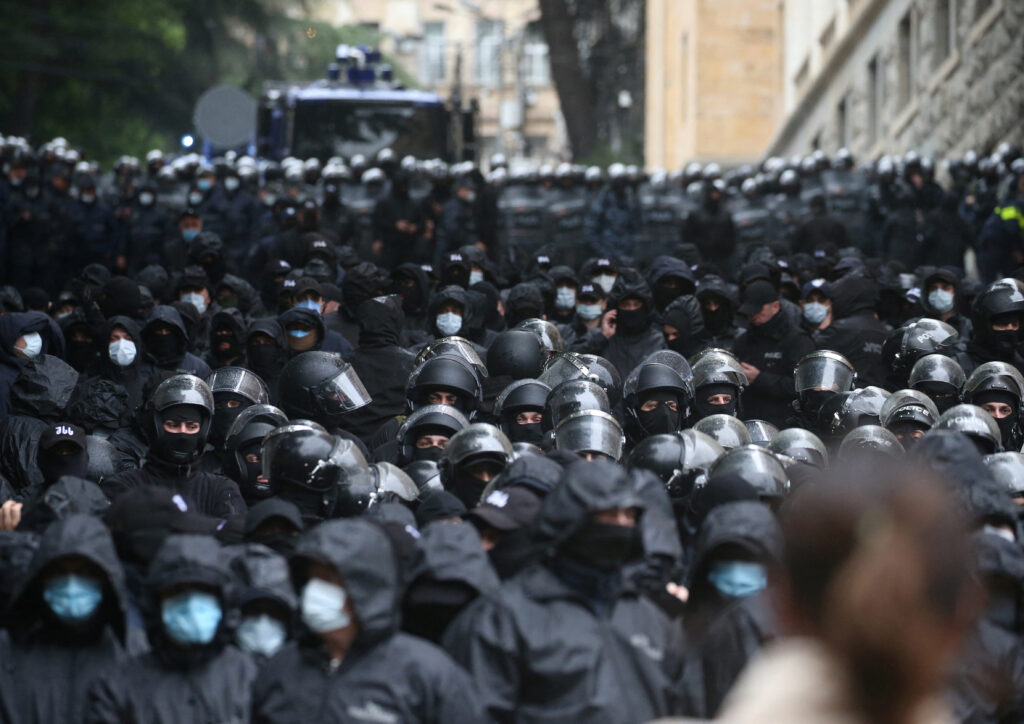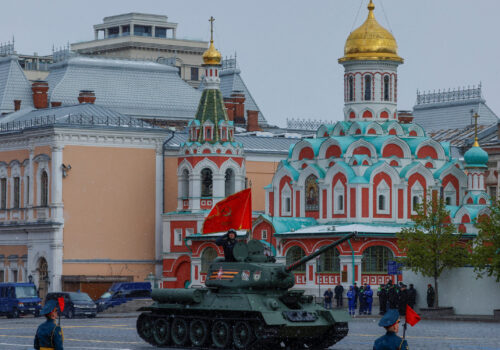Georgia is currently at the crossroads as the government pushes through contentious Kremlin-style legislation that opponents say will stifle civil society and prevent the country’s further European integration. At stake is the future trajectory of this small but strategically significant nation that plays an important role in the broader geopolitics of the post-Soviet space.
On May 14, the ruling Georgian Dream party passed the controversial “foreign agents” bill, which will oblige organizations that receive more than 20 percent of funding from abroad to register with the government or face fines. Despite claims to the contrary, this law resembles Russia’s own foreign agents legislation far more than the US Foreign Agents Registration Act.
EU officials responded to the news from Tbilisi by suggesting adoption of the legislation could hamper Georgia’s bid to join the European Union. “The EU stands with the Georgian people and their choice in favor of democracy and of Georgia’s European future,” commented the EU’s top diplomat Josep Borrell. US officials have also voiced concern over the issue.
Georgian Dream officials appear unmoved by these appeals. Indeed, critics say the passage of the foreign agents law is part of intentional efforts to derail the country’s Western integration and bring Georgia back into the Kremlin orbit. They claim the legislation is intended to suppress civil society in the lead-up to parliamentary elections in October, and note that Georgian authorities are now adopting tactics that closely mirror Russia’s own efforts to stamp out domestic dissent and silence opponents.
Stay updated
As the world watches the Russian invasion of Ukraine unfold, UkraineAlert delivers the best Atlantic Council expert insight and analysis on Ukraine twice a week directly to your inbox.
As unprecedented numbers have taken to the streets of Tbilisi to protest the country’s turn toward Moscow, the Georgian authorities have sought to crush protests with heavy-handed policing, including beatings, tear gas, and water cannons. Journalists and elected officials have been among those on the receiving end of violence.
In a further echo of tactics widely employed in Putin’s Russia, individual members of Georgia’s political opposition and activists have been assaulted in apparently targeted attacks that have taken place far from the protests. Others have been subjected to threatening phone calls and additional forms of harassment.
Meanwhile, the Georgian authorities are accused of copying the longstanding Russian practice of stage-managing pro-government rallies designed to distract attention from protests and create the illusion of popular support. One rally in late April featured thousands of public sector workers who had apparently been bussed into the Georgian capital from around the country and instructed to attend.
The rhetoric coming from Georgian Dream officials in recent weeks has increasingly resembled the anti-Western narratives and conspiracy theories favored by the Putin regime. In thinly veiled attacks on Georgia’s Western partners, Billionaire Bidzina Ivanishvili, the unofficial leader of Georgian Dream, has decried civil society organizations as “pseudo-elites” controlled by patrons abroad, and has accused them of attempting to instigate revolution in Georgia. These allegations are virtually indistinguishable from Vladimir Putin’s complaints regarding so-called “color revolutions.”
Eurasia Center events

Officially, the Georgian authorities deny they are seeking to turn the country away from the path of European integration and reject claims of a pro-Kremlin agenda. Indeed, Ivanishvili continues to insist Georgia is currently closer than ever to joining the EU. The ruling party’s careful rhetoric around Georgia’s European choice is understandable given that 81% of Georgians support EU membership. However, the fact that Georgian Dream moved forward with the foreign agents law despite condemnation from the EU and large-scale public protests has severely undermined the credibility of the government’s claims.
Georgian Dream officials say the foreign agents law is intended to ensure transparency and prevent undue foreign influence in the country, but critics remain unconvinced. They argue that the legislation will be used as a tool to suppress civil society, and point to the chilling role similar legislation has played in Russia. If it comes into force, many fear the law will strengthen the ruling party’s grip on power ahead of Georgia’s coming elections and set the stage for a more authoritarian form of government.
If Georgian Dream is able to secure a convincing result in the October ballot, Ivanishvili has already outlined plans for a strict “political and legal condemnation” of his party’s domestic opponents. In light of the mounting violence against opposition figures and pro-democracy protesters in Tbilisi in recent days, such statements must be taken seriously.
Hundreds of thousands of Georgians have joined protests this spring in an emphatic display of support for the country’s European future, but the struggle looks likely to continue throughout the coming months. The Georgian government has already demonstrated its readiness to employ Kremlin tactics. The question now is how far they are willing to go.
Lucy Minicozzi-Wheeland is a master’s student in Regional Studies: Russia, Eastern Europe, and Central Asia at Harvard and a Research Assistant at the Harvard Kennedy School.
Further reading
The views expressed in UkraineAlert are solely those of the authors and do not necessarily reflect the views of the Atlantic Council, its staff, or its supporters.

The Eurasia Center’s mission is to enhance transatlantic cooperation in promoting stability, democratic values and prosperity in Eurasia, from Eastern Europe and Turkey in the West to the Caucasus, Russia and Central Asia in the East.
Follow us on social media
and support our work
Image: Law enforcement officers stand guard near the parliament building as demonstrators hold a rally to protest against a bill on "foreign agents" in Tbilisi, Georgia, May 14, 2024. REUTERS/Irakli Gedenidze





